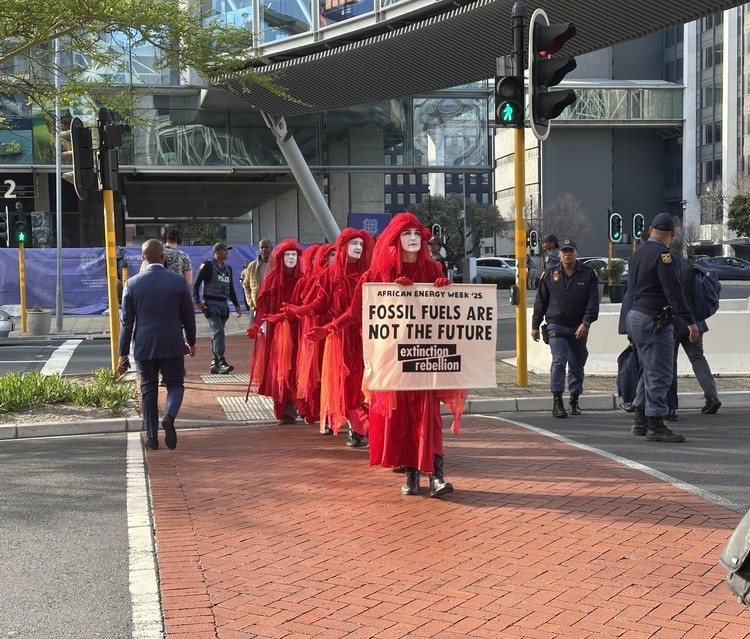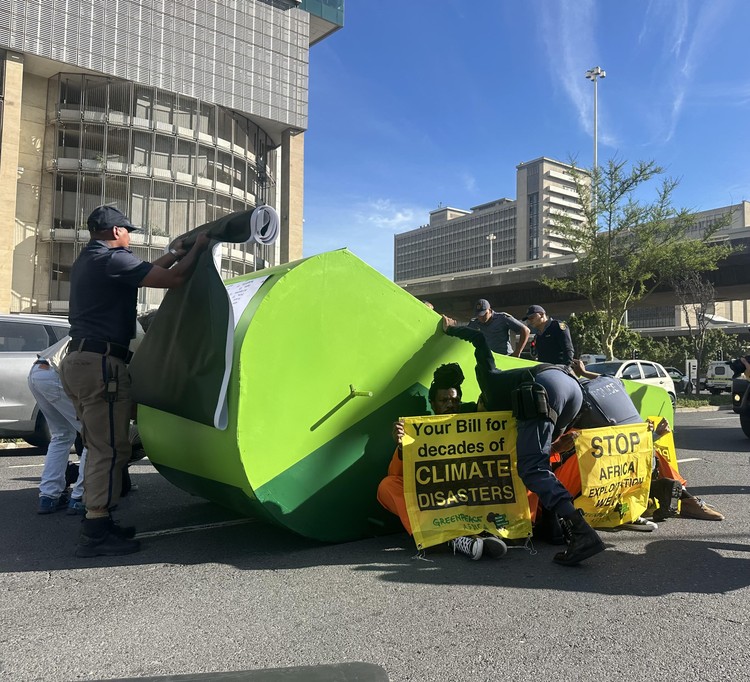Protest against fossil fuels at African Energy Week
“This is not the right way for Africa to go”
Members of Extinction Rebellion protested against fossil fuels at African Energy Week on Tuesday in Cape Town. Photos: Zora Hollie
About 50 people gathered outside Cape Town International Convention Centre on Tuesday afternoon to protest against fossil fuel. The centre is the venue for African Energy Week, an annual conference of international investors, politicians, and company executives.
Members of The Green Connection, African Climate Alliance, and Project 90 by 2030 joined the protest. They chanted and sang, holding signs that read “system change not climate change” and “no oil and gas”.
“We are tired of new fossil fuel projects in South Africa,” Sandrine Mpazayabo from Fossil Free South Africa said. “What we want is a serious consideration of renewable energy.”
Michelle Mhaka, spokesperson for African Climate Alliance, said it’s a lie that fossil fuels are the future of Africa’s economic development. “Marginalised communities are at the front lines of climate change,” Mhaka said. “Its impact is hitting them first, and chances are the people in those boardrooms and the high level executives have not started to feel those impacts yet.”
Earlier in the day, Greenpeace Africa and Extinction Rebellion held small demonstrations outside the convention centre.
Six Extinction Rebellion protesters walked around the centre, dressed in bright red robes and with their faces painted white.
“We’re just here to say this is not the right way for Africa to go,” Judy Scott-Goldman, one of the protesters, said. “We must embrace renewable energy.”
Seven Greenpeace Africa protesters then set up a giant mock card machine in the road in front of the centre, stopping traffic. The card machine was labelled “Polluter’s Climate Bill,” and included a list of global extreme weather events from the past ten years.
The demonstrators called for oil and gas companies to “pay up” for these disasters.
Police removed the “card machine”, and escorted the protesters out of the road.
Sherelee Odayar, Greenpeace Africa oil and gas campaigner, said oil and gas company lobbyists use the conference to talk about how they can exploit Africa’s natural resources.
“Why do we need more fossil fuels?” Odayar said. “Yes, Africa needs development, but we need sustainable development: development that does not harm the environment, does not harm people, and takes the climate crisis into consideration.”
GroundUp sent questions to a media representative from African Energy Week but did not receive a response in time for publication.
Police removed the “card machine” set up by protesters.
Support independent journalism
Donate using Payfast

Don't miss out on the latest news
We respect your privacy, and promise we won't spam you.
Next: Mustafa Barghouti and Jeremy Corbyn condemn Trump’s plan for Gaza
Previous: Human Rights Commissioner dodges overflowing sewage in Cape Town
Letters
Dear Editor
Your coverage of the African Energy Week protest captured more than just a dramatic scene outside the CTICC. It revealed the growing impatience of ordinary people with a fossil fuel industry still pretending to be the engine of Africa’s future. When activists have to dress in red robes or wheel out mock card machines to make their point, it is because reasoned argument has been drowned out by glossy promises from the oil and gas lobby.
The truth is that fossil fuel expansion is yesterday’s strategy dressed up as tomorrow’s promise. South Africa has the wind, the sun, and the human ingenuity to power a renewable revolution. What we lack is not capacity or technology, but political courage – the courage to admit that clinging to coal, oil and gas is not “development” but a debt, payable in human suffering. Every delay makes the bill bigger, and the poorest communities are already footing it through floods, fires, and food insecurity.
If African Energy Week is to remain relevant, it must stop being a stage for fossil fuel cheerleading and start platforming real solutions. Imagine if the conference spotlighted community-owned renewable projects that generate jobs, lower costs, and put power – literally – in the hands of ordinary South Africans. That would be a growth story worthy of the continent: development that empowers rather than exploits.
The transition is not a distant dream. It is already happening, often led by small communities and innovators who refuse to wait for permission. What is needed now is scale, investment, and leadership that matches the urgency of the climate crisis.
The question is not whether Africa can afford to switch to clean energy. The question is whether we can afford not to.
© 2025 GroundUp. This article is licensed under a Creative Commons Attribution-NoDerivatives 4.0 International License.
You may republish this article, so long as you credit the authors and GroundUp, and do not change the text. Please include a link back to the original article.
We put an invisible pixel in the article so that we can count traffic to republishers. All analytics tools are solely on our servers. We do not give our logs to any third party. Logs are deleted after two weeks. We do not use any IP address identifying information except to count regional traffic. We are solely interested in counting hits, not tracking users. If you republish, please do not delete the invisible pixel.


